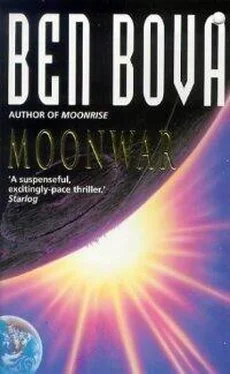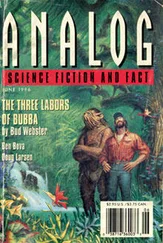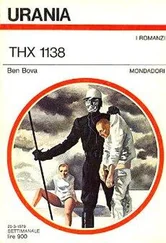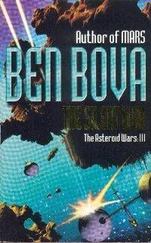Ben Bova - Moonwar
Здесь есть возможность читать онлайн «Ben Bova - Moonwar» весь текст электронной книги совершенно бесплатно (целиком полную версию без сокращений). В некоторых случаях можно слушать аудио, скачать через торрент в формате fb2 и присутствует краткое содержание. Год выпуска: 1997, ISBN: 1997, Издательство: Hodder & Stoughton, Жанр: Фантастика и фэнтези, на английском языке. Описание произведения, (предисловие) а так же отзывы посетителей доступны на портале библиотеки ЛибКат.
- Название:Moonwar
- Автор:
- Издательство:Hodder & Stoughton
- Жанр:
- Год:1997
- ISBN:0-340-68250-7
- Рейтинг книги:4 / 5. Голосов: 1
-
Избранное:Добавить в избранное
- Отзывы:
-
Ваша оценка:
- 80
- 1
- 2
- 3
- 4
- 5
Moonwar: краткое содержание, описание и аннотация
Предлагаем к чтению аннотацию, описание, краткое содержание или предисловие (зависит от того, что написал сам автор книги «Moonwar»). Если вы не нашли необходимую информацию о книге — напишите в комментариях, мы постараемся отыскать её.
Douglas Stavenger and his dedicated team of scientists are determined to defend their life’s work, but technology-hating factions on Earth want to close the flourishing space colony, Moonbase. Can a combination of military defence and political wisdom save the colony?
Moonwar — читать онлайн бесплатно полную книгу (весь текст) целиком
Ниже представлен текст книги, разбитый по страницам. Система сохранения места последней прочитанной страницы, позволяет с удобством читать онлайн бесплатно книгу «Moonwar», без необходимости каждый раз заново искать на чём Вы остановились. Поставьте закладку, и сможете в любой момент перейти на страницу, на которой закончили чтение.
Интервал:
Закладка:
Faure’s hugely enlarged features gazed down upon them from the wide Windowall screen up at the front of The Cave like an electronic deity, larger than life.
“There are those misguided souls,” Faure was saying, unconsciously touching the end of his moustache with a fingertip, “who ask why nanotechnology must be banned. There are those who question our policy.”
He looked up and smiled mechanically, almost squeezing his tiny eyes shut. “To paraphrase the American revolutionary Jefferson, in respect to the public opinion we should declare the causes that have impelled us to this decision.”
Jinny Anson, sitting next to Doug at the long cafeteria table, hissed, “That’s a real outgassing, using Jefferson.”
Doug nodded and said nothing.
Faure went on, “Nanotechnology offers enormous medical benefits, we are told. Its enthusiasts claim that nanomachines injected into the human body can prolong life and promote perfect health. Yes, perhaps. But for whom? For the starving masses of Africa or Latin America? For those dying of plagues because they are too poor to afford simple medical treatment?
“No! Nanotechnology would be available only to the very rich. It would be one more method by which the rich separate themselves from the poor. This cannot be allowed! The gap between the rich and poor is one of the most pernicious and dangerous causes of unrest and instability on Earth! We must strive to narrow this gap, not widen it.”
“By making everybody equally poor,” Joanna muttered, seated on Doug’s other side.
“Furthermore,” Faure continued, “nanotechnology can be used as an insidious new form of weapon, deadlier than poisonous gas, more difficult to detect and counter than biological weapons. In a world tottering on the brink of catastrophe, the very last thing we desire is a new weapons technology. We have worked for more than ten years now to convince nations to give up their armies and allow the Peacekeepers to protect their borders. We have reduced the world’s nuclear arsenals to a mere handful of missiles. We stand for disarmament and peace! How could we allow scientists in their secret laboratories to design perfidious new weapons of nanomachines?”
“So,” Zimmerman grumbled, down the table from Doug, “now I am an evil Dr Frankenstein.”
Faure took a sip of Evian, replaced the glass delicately on the podium, and resumed.
“As I said, every nation on Earth has finally signed the nanotechnology treaty. At last, there is no place on Earth where nanotechnology can be practiced or taught.”
Another burst of applause. But Doug knew what was coming next: the real reason for Faure’s speech.
“Yet there is a place where nanotechnology is practiced every day, every hour. That place is not on Earth. It is on the Moon, at the privately owned center called Moonbase.”
“Pass the bread, here comes the baloney,” somebody in the cafeteria said, loudly enough to echo off the rock walls. No one laughed or even stirred to see who said it.
“The residents of Moonbase have refused to suspend their nanotechnology workings. They have refused to stop their researches into new forms and uses of nanotechnology.” Faure’s face had become grim. “True, they have offered to allow United Nations representatives to inspect their facilities and their laboratories, but they absolutely refuse to abide by the requirements of the nanotechnology treaty.”
He looked up at his audience. “This cannot be allowed! We cannot permit them to develop further the nanotechnology in secret, some four hundred thousand kilometers away from our supervision!”
Faure’s moustache was starting to bristle. “Who knows what kinds of new and dreadful capabilities they are developing in their secret laboratories? Who knows what their intentions are?”
People in The Cave were jeering now. “The bastard knows we need nanobugs to make the air we breathe!”
Taking a deep breath, Faure raised his hands as if motioning for attention. “Therefore, I have sent a detachment of Peacekeeper troops to Moonbase to enforce the conditions of the nanotechnology treaty on the lunar residents. They will arrive at Moonbase within slightly more than four days. Their mission is one of peace; but they are of course prepared to defend themselves if the Moonbase residents offer resistance.”
Faure looked up again and peered directly into the camera. He seemed to loom above the people in The Cave.
“To these renegades of Moonbase I have this to say: Resistance is futile. You must obey the same laws that everyone on Earth obeys. I will employ all the power necessary to enforce the conditions of the nanotechnology treaty, whether on Earth or on the Moon. If, in your misguided attempts to defy the United Nations and the will of the peoples of Earth, you use force against our Peacekeepers, you will regret it.”
The audience applauded wildly. Faure smiled and dipped his chin several times: his way of bowing. Then the screen went blank.
Doug blinked several times. The crowd in The Cave stirred and rumbled with a hundred conversations.
“He didn’t mention a word about our declaration of independence,” Joanna said.
“Nor our request for U.N. membership,” Brudnoy added.
Doug got to his feet. “And he isn’t going to have a news conference, where reporters can ask him questions, either.”
“How long until the Peacekeepers land?” Anson asked.
Doug pressed the face of his wristwatch; the digital readout changed from the local time to a countdown.
“One hundred eleven hours and forty-eight minutes,” he said.
“Well,” Anson said, digging her hands into the pockets of her jeans, “you’d better think of something between now and then, boss.”
TOUCHDOWN MINUS 111 HOURS 48 MINUTES
“You’re right,” Doug said to Anson.
He clambered up onto the cafeteria table and raised his arms over his head. “Hey!” he shouted to the murmuring, scattering crowd. “Hold on! I’ve got a few words to say.”
The crowd stopped heading for the exit and turned toward him, some looking expectant, others puzzled.
“You Lunatics so eager to get back to work that you can’t hang in here a couple minutes more?” Doug asked, grinning at them.
“Hell, boss, we’ll stay all day if you want us to,” hollered one of the men in the rear.
“If you serve some drinks,” another voice chipped in.
Doug kept his grin in place. “No drinks. And this is only going to take a few minutes.”
Someone groaned theatrically. A few people laughed at it.
“I want you to know,” Doug said, scanning their faces, “that we declared Moonbase’s independence a few hours ago. We had to do it, so that as an independent nation we can refuse to sign the nanotech treaty and continue to work here the way we always have.”
“You mean we’re citizens of Moonbase now?” a woman asked.
“I have to give up my American citizenship?” another voice from the crowd.
“That’s all to be ironed out in negotiations with the US government and other governments,” Doug said. “We’re not going to ask any of you to give up your original citizenship, not if you don’t want to.”
“What about those Peacekeeper troops Faure’s sending here?”
“We’ll tell them we’re an independent nation now and they have no authority here,” Doug answered.
“They gonna accept that?”
“We’ll see,” said Doug.
“Don’t give up your day job,” somebody said. Everyone laughed—nervously, Doug thought. But when he looked down at his mother, still seated at the table on which he was standing, she was not laughing at all. Not even smiling.
“We’ll deal with the Peacekeepers when they get here,” Doug promised. “They’re not looking for a fight and neither are we.”
Читать дальшеИнтервал:
Закладка:
Похожие книги на «Moonwar»
Представляем Вашему вниманию похожие книги на «Moonwar» списком для выбора. Мы отобрали схожую по названию и смыслу литературу в надежде предоставить читателям больше вариантов отыскать новые, интересные, ещё непрочитанные произведения.
Обсуждение, отзывы о книге «Moonwar» и просто собственные мнения читателей. Оставьте ваши комментарии, напишите, что Вы думаете о произведении, его смысле или главных героях. Укажите что конкретно понравилось, а что нет, и почему Вы так считаете.












